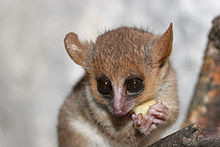
A philosophical question for you: Why do stories about dinosaur extinction bring out the punster in headline writers? In other news, we have a wealth of interesting stories for you this week plus a bonus adorable video. WAAAAY cuter than kittens.
- The Domesticated Human, Sapiens, April 5, 2016 — For World Wildlife Day, anthropologist Caitlin Schrein (the delightful @paleophile on Twitter) ponders this question: Are humans still “wild”? If not…why? You’ll be surprised at how many of our most human traits are not unique to us.
- Reduced Flight-to-Light Behaviour of Moth Populations Exposed to Long-term Urban Light Pollution, Biology Letters, April 12, 2016 — Researchers in Switzerland and France found that urban populations of the small ermine moth are less attracted to light than rural populations. These difference appeared even when the moths were raised from eggs, indicating that the difference is genetic. The differences are likely driven by increased predation on moths at urban lights, a case study in natural selection with eerie echoes of Kettlewell’s iconic research on peppered moths darkening as a result of industrial soot.
- The Quest for Historical Accuracy: Ronald Numbers Replies to William VanDoodewaard, BioLogos, April 15, 2016 — The historian Ronald L. Numbers convincingly replies to a critic who contended that his scholarship “not only overemphasized the decline of scriptural geology in the second half of the nineteenth century but exaggerated the importance of the Seventh-day Adventist flood geologist George McCready Price in bringing about its revival.”
- The Long Decline of the Dinosaurs, The Atlantic, April 18, 2016 — The always excellent Ed Yong discusses the long decline—or as the URL suggests, the long diminuendo—of the dinosaurs, which a new study confirms were already in trouble before the K-T extinction event.
- Are Humans Definitely Smarter Than Apes?, Slate, April 18, 2016 — “The evolutionary tree is rather shaped like a giant bush, with branches in many different directions, allowing sophisticated tool use in crows, highly coordinated cooperation in orcas, and inferential reasoning in apes,” writes Frans de Waal, in this excerpt from his new book Are We Smart Enough to Know How Smart Animals Are?
- Opponents of Kansas Schools’ Science Standards Lose Legal Battle, Topeka Capital-Journal, April 19, 2016 — Opponents of Kansas’ new science standards have lost their legal battle. The group had argued that the science standards were anti-religious and violated their religious rights. The judges in the case found that the plaintiffs did not have legal standing and further noted that the science standards “simply establish performance expectations for what students should know and be able to do at each K-12 grade level.” They further noted, “The Standards do not condemn any or all religions and do not target religious believers for disfavored treatment.”
- Video: Three Baby Red-Ruffed Lemurs Are Now Frolicking At The National Zoo, DCist, April 20, 2016 — Guys. Baby lemurs. Video of baby lemurs. No, really. Just click.
- Vitellogenin and Common Ancestry, BioLogos, February 1–-April 21, 2016 — In a five-part series, Dennis Venema explains why the remains of vitellogenin gene sequences in the genomes of placental mammals are good evidence for their descent from egg-laying ancestors—and comprehensively debunks creationist claims to the contrary.
- And the Beak Shall Inherit the Earth: Why Did Birds Live When Dinosaurs Died? The Globe and Mail, April 21, 2016 — From alert reader Steve Bowden, a story about research with a hypothesis about why some birds may have survived the event that caused the extinction of the dinosaurs, including an interesting story about how the idea for the research was generated. Another link about the same story from the BBC: Why Did Birds Live While Dinosaurs Died?: It’s a Seedy Story, Researchers Say.
- A Candid Mother-Daughter Talk on Parenting in the Age of Climate Change, Huffington Post, April 22, 2016 — A mother/daughter conversation about the issues and ethics of bringing children into a future challenged by climate change.
Photo credit: By Arjan Haverkamp

